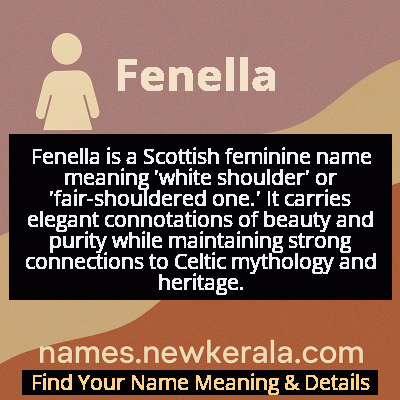Fenella Name Meaning & Details
Origin, Popularity, Numerology Analysis & Name Meaning of Fenella
Discover the origin, meaning, and cultural significance of the name FENELLA. Delve into its historical roots and explore the lasting impact it has had on communities and traditions.
Name
Fenella
Gender
Female
Origin
Scottish
Lucky Number
1
Meaning of the Name - Fenella
Fenella is a Scottish feminine name meaning 'white shoulder' or 'fair-shouldered one.' It carries elegant connotations of beauty and purity while maintaining strong connections to Celtic mythology and heritage.
Fenella - Complete Numerology Analysis
Your Numerology Number
Based on Pythagorean Numerology System
Ruling Planet
Sun
Positive Nature
Leaders, ambitious, highly driven, self-reliant, innovative.
Negative Traits
Overly aggressive, domineering, impatient, selfish.
Lucky Colours
Red, orange, gold.
Lucky Days
Sunday.
Lucky Stones
Ruby, garnet.
Harmony Numbers
2, 3, 9.
Best Suited Professions
Entrepreneurs, managers, engineers.
What People Like About You
Courage, determination, leadership.
Famous People Named Fenella
Fenella Fielding
Actress
Iconic British actress known for her distinctive voice and roles in Carry On films
Fenella Woolgar
Actress
Recognized for her roles in period dramas and Agatha Christie adaptations
Fenella Kernebone
Broadcaster
Prominent Australian radio and television presenter for national networks
Name Variations & International Equivalents
Click on blue names to explore their detailed meanings. Gray names with will be available soon.
Cultural & Historical Significance
Extended Personality Analysis
Women named Fenella are often associated with a distinctive blend of grace, intelligence, and quiet determination. The name suggests someone who carries themselves with natural elegance and poise, yet possesses an inner strength that enables them to navigate life's challenges with resilience. Fenellas are typically perceived as thoughtful and perceptive individuals, with a deep appreciation for beauty in all its forms—whether in art, nature, or human relationships. Their mythical associations hint at a transformative quality, suggesting an ability to adapt to changing circumstances while maintaining their core values and identity. Many Fenellas display a creative spirit, often expressing themselves through artistic pursuits, writing, or cultural preservation. They tend to be loyal friends and family members, valuing deep connections and traditional bonds. The name also implies a certain wisdom beyond years, as if carrying the weight of ancestral knowledge and cultural heritage. At the same time, Fenellas often possess a modern sensibility, blending traditional values with contemporary insights in a way that makes them both grounded and forward-thinking.
Modern Usage & Popularity
In contemporary naming practices, Fenella remains a distinctive choice that appeals to parents seeking a name with deep cultural roots and elegant sound without being overly common. While it has never reached the popularity charts in most English-speaking countries, it maintains a steady, niche presence particularly in Scotland and among Scottish diaspora communities. The name experiences periodic revivals, often coinciding with broader trends favoring Celtic and traditional names. In recent years, there has been modest increased interest in Fenella as part of the movement toward unique yet meaningful names that honor heritage while standing out from more common choices. Its usage extends beyond Scotland to England, Australia, Canada, and the United States, where it appeals to parents of Scottish descent or those simply drawn to its melodic quality and mythological background. The name's relative rarity in modern times adds to its appeal for parents seeking something distinctive yet classic, offering a connection to Celtic culture without being overtly ethnic or difficult to pronounce.
Symbolic & Spiritual Meanings
Symbolically, Fenella embodies multiple layers of meaning drawn from its etymological roots and mythological associations. The core meaning of 'white shoulder' or 'fair-shouldered one' suggests both physical beauty and moral purity, while also carrying connotations of bearing burdens with grace and strength. The name's connection to the swan in Celtic mythology adds powerful symbolic dimensions—the swan represents transformation, elegance, and the ability to move between different states of being or realms of existence. This mythological association symbolizes endurance through adversity, as seen in the story of Fionnuala who maintained her identity through centuries of transformation. Fenella also carries symbolic weight as a bridge between cultures, representing the shared Gaelic heritage of Ireland and Scotland. The name suggests someone who can navigate between tradition and modernity, between different cultural influences, while maintaining a strong sense of self. It symbolizes the preservation of cultural memory and ancestral wisdom, making it a name that carries both personal and collective significance.

